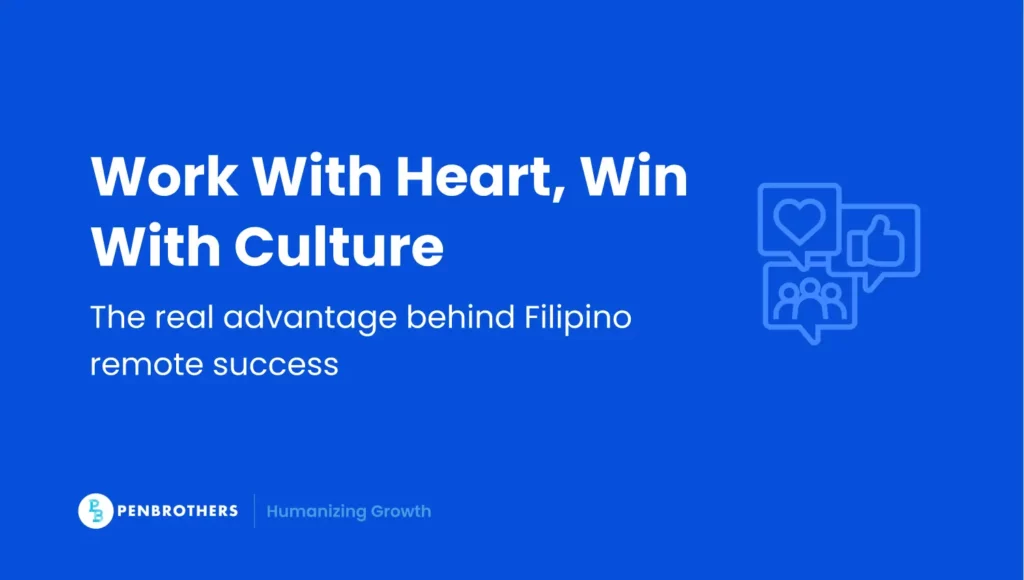The rise of the Philippine remote workforce is more than a story of talent supply. It’s a story of cultural power. Filipino professionals have become indispensable to global teams not only because they’re skilled and English-proficient but because they bring a deeply human approach to work rooted in family, empathy, and collective purpose.
For organizations scaling remote operations, this cultural depth is both an opportunity and a responsibility. When global leaders understand how Filipino values shape communication, motivation, and collaboration, they unlock a workforce that’s not just productive but profoundly aligned, resilient, and loyal.
This article explores how Filipino culture shapes the modern remote work experience, what global leaders often overlook, and how to translate these insights into actionable, sustainable workforce strategies.
Family as the Core Motivation: The Invisible Engine of Loyalty
In the Philippines, work is rarely viewed as a purely individual pursuit. It’s a shared endeavor, a way to uplift an entire family. This family-centered drive often becomes the moral compass that fuels Filipino professionals’ discipline, consistency, and ambition in remote roles.
Many Filipino workers view career stability and employer trust as extensions of providing for their families. This dynamic explains why turnover rates are often lower among Filipino remote employees who feel secure and valued.
For employers:
Recognizing the role of family transforms how you design policies. Offering flexible work schedules for family obligations, health insurance that extends to dependents, or family-centered recognition programs isn’t just good benefits design. It’s cultural alignment.
Tip for managers:
When leaders frame professional success as a contribution to one’s family legacy, employees experience deeper purpose. Praise that acknowledges not only achievement but what it enables “a better future for your loved ones,” resonates far more deeply in Filipino work culture.
Bayanihan: The Filipino Cultural Blueprint for Collective Success
Few cultural values are as distinctly Filipino as bayanihan, the spirit of communal unity and cooperation. Historically, it described neighbors literally helping one another move homes, but in the remote workplace, it manifests as peer support, cross-functional generosity, and proactive collaboration.
In virtual environments where isolation can fragment teams, bayanihan creates cohesion. Filipino professionals are often quick to assist colleagues, share solutions, and step into roles beyond their own to ensure collective success.
For employers:
This cooperative mindset is an invaluable soft-skill advantage. When nurtured, bayanihan drives knowledge sharing, boosts morale, and reduces internal silos across distributed teams.
Manager insight:
Reinforce this spirit through recognition systems that value teamwork over individual heroics. For instance, highlight “team contribution moments” in town halls or create peer-to-peer recognition programs. Leaders who celebrate cooperation, not competition, amplify the natural bayanihan embedded in Filipino culture.
Resilience and Adaptability: Strength Forged Through Context
The Filipino workforce’s adaptability isn’t accidental. It’s historical. Centuries of colonization, natural disasters, and economic challenges have shaped a population that thrives under uncertainty. This cultural resilience now powers how Filipinos navigate global remote work dynamics.
When faced with shifting priorities, ambiguous instructions, or unstable infrastructure, Filipino professionals rarely disengage. Instead, they find workarounds, often with quiet, steady determination.
For employers:
This resilience is a tremendous asset for startups and dynamic environments, where change is constant. Filipino workers don’t just survive turbulence. They stabilize teams through calm competence.
Manager insight:
Resilience, however, can be misinterpreted as limitless endurance. Leaders must recognize that behind composure may lie fatigue. Supporting this strength means providing reliable tools, clear escalation protocols, and access to wellness programs. The goal isn’t to test resilience. It’s to sustain it.
Communication Nuance: Reading Between the Lines
Filipinos are culturally wired for pakikisama or maintaining harmony and avoiding direct confrontation. In global teams, this often surfaces as politeness, avoidance of blunt disagreement, or softened feedback. While this fosters respect, it can sometimes be mistaken for a lack of initiative or transparency.
For employers:
Indirect communication isn’t passivity. It’s diplomacy. Filipinos value preserving relationships as much as delivering outcomes. Understanding this allows leaders to decode silence not as disinterest but as thoughtfulness or caution.
Manager insight:
To balance harmony with clarity, model what respectful transparency looks like. Phrase feedback as collaborative dialogue (“Let’s explore this idea together”) and normalize clarification questions. Over time, Filipino team members learn that assertiveness, when framed with care, strengthens, not disrupts relationships.
Paggalang: Respect That Strengthens Organizational Discipline
Filipino professionals are taught from a young age to show paggalang or deep respect for elders, authority, and hierarchy. In workplaces, this manifests as politeness, deference, and a preference to “wait their turn” before speaking.
This respect creates orderly teams but can unintentionally stifle idea exchange when leaders aren’t proactive. Employees may hesitate to challenge directives even when they see better solutions.
For employers:
Paggalang is a double-edged sword. It strengthens discipline and accountability but requires modern leadership to translate it into empowered participation.
Manager insight:
Encourage ideas through structure: rotate meeting facilitators, use anonymous input channels, and explicitly invite counterpoints. When leaders show that respect and dissent can coexist, Filipino employees bring forth a wealth of insight and innovation previously held back by hierarchy.
Malasakit: Care as a Competitive Advantage
Perhaps the most emotionally resonant Filipino value is malasakit, or the profound concern for others’ well-being and success. It transcends job descriptions and transforms workplace relationships into genuine human connections.
Employees with malasakit go beyond metrics; they care about the company’s reputation, their colleagues’ morale, and the clients’ satisfaction. This intrinsic empathy gives Filipino remote professionals a natural edge in service-oriented and client-facing roles.
For employers:
When nurtured, malasakit creates teams that are self-motivated, emotionally intelligent, and mission-aligned.
Manager insight:
Recognize malasakit not only through rewards but through culture. Leaders who mirror care when asking about family, listening deeply, and celebrating life events. This strengthens this cycle of empathy. In Filipino culture, care begets care.
English Fluency and Cultural Fluidity
Filipinos’ high English proficiency and cultural adaptability stem from a uniquely blended heritage. Asian roots, Western education, and global media influence. This makes them highly effective cross-cultural communicators who can mirror tone and adjust to varied client expectations.
For employers:
This linguistic and cultural dexterity enables Filipino teams to bridge global gaps and maintain operational flow across regions.
Manager insight:
However, don’t mistake fluency for uniform understanding. Clarify expectations, confirm shared meaning, and be sensitive to cultural metaphors that might not translate equally. Effective global communication isn’t about speaking English perfectly. It’s about connecting meaningfully.
The Hidden Struggles of Remote Filipino Workers
Behind the success stories are structural challenges: unreliable infrastructure, time zone conflicts, and the emotional toll of working nights while family sleeps. These can erode engagement if not properly addressed.
Manager insight:
- Combat isolation: Build micro-communities within teams such as mentorship circles, interest-based Slack channels, or “virtual tambay” (hangout) sessions.
- Support connectivity: Provide tech stipends, flexible work windows, and clear downtime protocols.
- Respect rest: Acknowledge time zone sacrifices and implement rotation schedules when feasible.
These aren’t just logistical accommodations. They’re acts of cultural empathy that reinforce retention and trust.
Redefining Global Workforce Integration Through Cultural Intelligence
Integrating Filipino culture into global workforce design isn’t about exoticizing differences. It’s about operationalizing empathy. When leaders align organizational systems with cultural realities, productivity follows naturally.
For global leaders:
- Reimagine people policies to reflect Filipino values like flexibility, family, and care.
- Invest in leadership training that develops cross-cultural intelligence, not just compliance management.
- Foster dual accountability. Global performance standards paired with local cultural understanding.
The future of remote work depends less on technology and more on trust. Trust grows fastest where culture is understood, not overlooked.
Conclusion
Filipino culture offers a model of human-centered productivity the world can learn from. Its values, such as family orientation, communal spirit, resilience, respect, and care, transform the mechanics of remote work into something more profound: shared purpose.
For global organizations, understanding Filipino culture isn’t an HR nicety; it’s a leadership competency. By building systems that honor these values, companies don’t just hire remote workers. They cultivate long-term partners who carry both skill and soul into their work.






